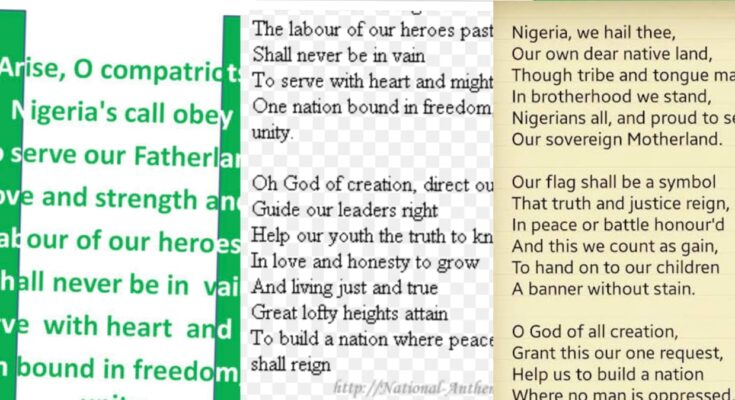The national anthem of Nigeria, “Arise, O Compatriots, Nigeria’s Call Obey,” holds a special meaning for Nigeria and its people. Adopted in 1978 to replace “Nigeria We Hail Thee,” the anthem’s lyrics urge Nigerians to stand up with dedication and unity to build their beloved country.
John A. Ilechukwu, Eme Etim Akpan, B. A. Ogunnaike, Sota Omoigui and P. O. Aderibigbe penned the anthem’s lyrics. The music was composed by the Nigerian Police Band under the directorship of Benedict Elide Odiase.
The opening line, “Arise, O compatriots,” is a rousing call to action for Nigerians to actively elevate their country. This line sets the anthem’s tone of inspiration, encouragement and national pride. Join us to show the cultural significance of this anthem.
READ ALSO: Free Sowore: Omoyele Sowore’s battle for Nigerian democracy
Inception: Birth of an Anthem
The genesis of Nigeria’s national anthem can be traced back to the country’s attainment of independence on October 1, 1960. It was a momentous occasion, symbolizing the end of colonial rule and the dawn of a new era for the Nigerian people. As part of the nation-building process, the need for a national anthem became evident—a musical expression that could encapsulate the essence of Nigeria’s identity and aspirations.
The task of crafting this musical embodiment fell upon the capable shoulders of the Nigerian Police Band, under the leadership of Benedict E. Odiase. Working in collaboration with a committee, which included the likes of L. Sean Taro, Ile Isele Ugbogbo, and Michael Ekpo, Odiase began the composition of what would soon become Nigeria’s anthem. The objective was clear—to create a melody that would evoke patriotism, unity, and a sense of national pride.
Arise, O Compatriots
Nigeria’s call obey
To serve our fatherland
With love and strength and faith
The labour of our heroes past,
shall never be in vain
To serve with heart and might,
One nation bound in freedom, peace and unity.
II
Oh God of creation,
Direct our noble cause
Guide thou our leaders right
Help our youth the truth to know
In love and honesty to grow
And living just and true
Great lofty heights attain
To build a nation where peace and justice shall reign
Melodic Evolution: From “Nigeria, We Hail Thee” to “Arise, O Compatriots”
The first rendition of Nigeria’s national anthem was titled “Nigeria, We Hail Thee.” Composed by Frances Berda and arranged by the Nigerian Police Band, this early version reflected the exuberance and optimism of the newly independent nation.
However, it soon became apparent that the anthem needed a more inclusive and forward-looking tone to mirror Nigeria’s diverse population and ambitious future.
In 1978, the anthem transformed, and the lyrics were rewritten by a committee chaired by the late Professor Babatunde Ogunnaike. The result was today’s anthem known as “Arise, O Compatriots.” The lyrics, penned by the committee, resonated with themes of unity, peace, and progress, capturing the collective aspirations of Nigerians across ethnicities, religions, and regions.
Symbolism in Lyrics: Meaning of the Anthem’s Verses
The anthem’s lyrics, composed of two stanzas, are steeped in symbolism and deep meaning. The opening lines, “Arise, O compatriots, Nigeria’s call obey,” are a rallying cry for unity and national service.
The anthem goes on to exhort Nigerians to “serve with heart and might,” emphasizing the collective responsibility of citizens in building a prosperous and united nation.
The second stanza delves into the beauty of Nigeria’s landscape, celebrating its “labours of our heroes past” and expressing hope for a future “where peace and justice shall reign.” These verses encapsulate the resilience of the Nigerian spirit, acknowledging the sacrifices made by past generations while envisioning a harmonious and equitable future.
READ ALSO: Tinubu’s meets with King Charles III before COP28 Climate Conference
Cultural Significance: Anthem in National Identity
Nigeria’s national anthem has transcended its role as a mere musical composition; it has become an integral part of its national identity. Whether sung at official ceremonies, sporting events, or schools, the anthem is a unifying force, fostering a sense of patriotism and shared purpose among Nigerians.
In the realm of cultural diplomacy, the anthem acts as a symbol of Nigeria’s unity and pride on the international stage. Its melody echoes in Nigerians’ hearts at home and in the diaspora, forging a connection that transcends geographical boundaries.
Conclusion
As Nigeria celebrates its national anthem on its Independence Day, it is not merely a reflection on the past but a call to embrace the future with hope and determination.
The anthem concludes by calling on God’s blessing over Nigerians’ noble aspirations for their nation: “The labour of our heroes past/Shall never be in vain.”
Truly, Nigeria’s national anthem voices the country’s dreams, pride, ideals, and determination, which are moulded into poetic lyrics and set to rousing music.








